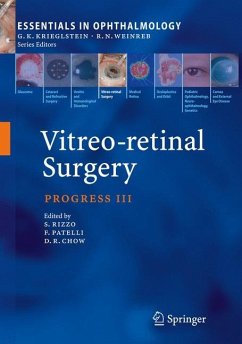Since the introduction of vitrectomy in the 1970s, vitreoretinal surgery has rapidly developed. Initially, new instrumentations were created to facilitate intraocular maneuvers and to treat almost all the vitreoretinal pathologies. High speed vitrectome probs, forceps, scissors, endolaser probes, and new light sources (xenon/photon light) permit us to perform safer surgeries.
However, in the last few years the approach to vitreoretinal surgery has changed with the introduction of small gauge instruments and sutureless surgery. At present there is still confusion among vitreoretinal surgeons about the use of 25-, 23- or 20-gauge sutureless systems.
Leading surgeons in the field were recruited to offer their insights into the sutureless techniques they perform.
Topics dealt with in the book include: - fluidics and technical characteristics of 23- and 25-gauge systems, - basic vitrectomy techniques of 23- and 25-gauge systems, - sclerotomy characteristics ofthe sutureless approach, - advantages and disadvantages of the sutureless technique, - vitreoretinal pathologies treated with 23- and 25-gauge systems, - complications of the sutureless technique, - current clinical data.
However, in the last few years the approach to vitreoretinal surgery has changed with the introduction of small gauge instruments and sutureless surgery. At present there is still confusion among vitreoretinal surgeons about the use of 25-, 23- or 20-gauge sutureless systems.
Leading surgeons in the field were recruited to offer their insights into the sutureless techniques they perform.
Topics dealt with in the book include: - fluidics and technical characteristics of 23- and 25-gauge systems, - basic vitrectomy techniques of 23- and 25-gauge systems, - sclerotomy characteristics ofthe sutureless approach, - advantages and disadvantages of the sutureless technique, - vitreoretinal pathologies treated with 23- and 25-gauge systems, - complications of the sutureless technique, - current clinical data.








